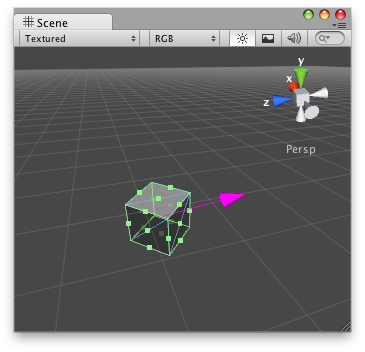static function Slider (position : Vector3, direction : Vector3, size : float, drawFunc : DrawCapFunction, snap : float) : Vector3
Parameters
| Name | Description |
|---|---|
| position | the position of the current point. |
| direction | the direction of the sliding. |
| float | 3D size the size of the handle - HandleUtility.GetHandleSize (position); |
| drawFunc | the function to call for doing the actual drawing - by default, it's Handles.ArrowCap, but any function that has the same signature can be used. Note: Use HandleUtility.GetHandleSize where you might want to have constant screen-sized handles. |
Description
Make a 3D slider
This will draw a 3D-draggable handle on the screen. The handle is constrained to sliding along a direction vector in 3D space.

Slider handle in the Scene View.
// Simple script that creates a Magenta Slide Handle that
// points to (0,0,0) nomatter where the target GameObject is located.
@CustomEditor (Slide)
class SliderHandleJS extends Editor {
function OnSceneGUI () {
Handles.color = Color.magenta;
target.vectorPoint = Handles.Slider (target.transform.position,
Vector3.zero - target.transform.position);
if (GUI.changed)
EditorUtility.SetDirty (target);
}
}
And the script attached to this Handle:
// Usage: Place this script on the Game Object you want to use the
// editor-created slide handle.
@script ExecuteInEditMode()
var vectorPoint : Vector3 = Vector3(0,0,0);
function Update() {
Debug.Log("Looking at: " + vectorPoint);
}